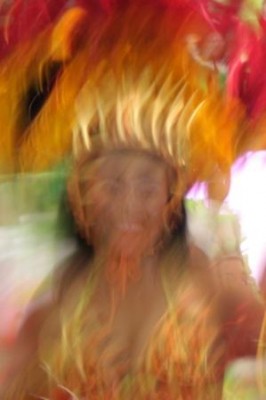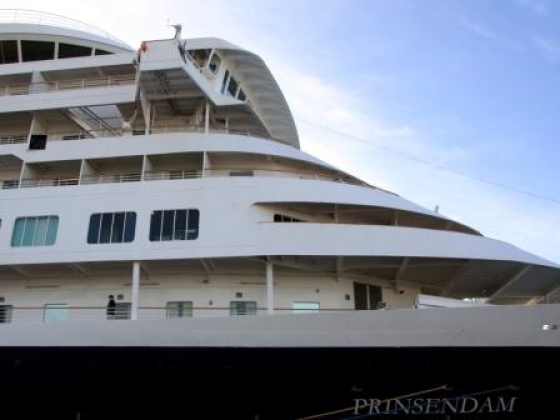The day started with a surprise: we were not allowed to take our own food anymore, not even our own coffee from the simple push-button machine! To tell the truth, after an utterly unrefreshing night’s sleep and pull-pushing myself up the stairs to the 11th floor restaurant, I didn’t really appreciate having to point at, or explain, what I would have liked for breakfast. Moreover, how would I explain to them that the little plate had to filled with plenty of peppered tomato slices, some marinated salmon, to literally “top it off” with two or three slices of rye bread, – no butter, thanks! They have not been taught to just put bread on top of all the other goodies underneath. It is blasphemy for them! To avoid all the hassle, I just had two slices of bread and two little potties of jam, with a coffee at another queue.
 While some passengers “in the know” had already whispered with a loud, scratchy morning voice that “there was quite a few people sick you know”, most of the boat was still asleep at 7:30 am, especially since the captain had moved the clock forward last night. As a matter of fact, he must have woken up many a sleeping beauty when, just before eight, he announced “new procedures” over the general intercom (also booming uninhibitedly in the passenger rooms). The reason: “GI”. No, American troops had not come aboard the ship.
While some passengers “in the know” had already whispered with a loud, scratchy morning voice that “there was quite a few people sick you know”, most of the boat was still asleep at 7:30 am, especially since the captain had moved the clock forward last night. As a matter of fact, he must have woken up many a sleeping beauty when, just before eight, he announced “new procedures” over the general intercom (also booming uninhibitedly in the passenger rooms). The reason: “GI”. No, American troops had not come aboard the ship.
Instead, the message concerned “the plague of the cruise ships” which, so he said, is the second most frequent disease in the USA after the common cold: gastro-intestinal virus. From here on, enhanced prophylaxis would be enforced until all symptoms had disappeared. It ain’t fun but it is in the interest of the passengers. I agree, but could not resist the thought that, one of these years, passengers will have to walk around in spacesuits because their own virus-killing systems will be so weakened that any kind of bug will put them down for a couple of days.
Alter do Chaõ, a tender port, owes its name to a 500ft altar-like hill that sits above silvery-white sand beaches that line the blue waters of the Tapajós River, about 30km south of Santarèm. These same beaches have a short useful annual lifespan: by the month of March they will be swallowed by the rising river and the only sight remaining will be the “Alter”, high above, and very dry come July.
Because sunbathing (not evident in the rain season anyway!) on the beach was not my first priority, I had booked a trip to an unspoiled tract of rainforest, 60km inland – so to speak. The bus ride itself was already an experience. It happened to be a regional line bus. The conductor’s high chair was left intact, together with the mention that bills of more than B$10 (about $6 or €4) were not accepted. We had paid much more for this trip of course, and had also been told that the bus most likely would have neither a working mike nor any kind of air-conditioning.
The mike was working and the guides were good. The combination was a blessing. They also explained why the bus had no air-conditioning. I thought that line buses simply aren’t designed and built with A/C. Apparently in Brazil they really have done a deeper analysis and have come to the conclusion that A/C is not good for the public health. Therefore we open all the windows and enjoy the air flow. (We also close them often, when we drive through one of the many, intense showers; that is good exercise because they are not regularly oiled). Actually, with the GI virus in mind, I considered it a welcome discourse with a clear message for my western friends: get exposed to nature and keep your natural defenses in shape!
Little did I know that this was not the end of the story… Indeed, researchers in Amazonas had found that the scent of the trees actually helped people to increase their resistance to all kinds of bodily intruders, in other words these scents had medicinal benefits. The guide added that pharmaceutical companies had descended over the region to study these matters. One of these years we might see Brazilian-scented air-conditioners in our luxury houses…
In any event, after 90 minutes of driving, we landed in a jungle. I know little about plants and insects, and it never has really interested me, as my mother must have realized early on as I often became sick if she had me work in the garden as a young lad. I learned that the jungle is more than high trees and less than lots of jaguars. Most dangerous, said our machete-wielding guide, were poisonous spiders and beetles, not the relatively rare predators. There is also a astonishing variety of fruits (200 on the local markets, 3000 according to the Indians) and herbs with proven medicinal characteristics. I think I have come to realize that the rainforest is a place wherein you can really survive and prosper, barring big injuries or unusual diseases.
What I also take away from the jungle is a new definition: in the rain forest 20% is rotten, 20% is flower, fruit or seed bearing, and the other 60% is quickly moving to one of those two states of being. There is no pause, nowhere: life is visibly in continuous flux everywhere. Creation and destruction compete for supremacy.
The next two days we are sea-bound, to finally arrive, on Saturday, in Belèm, the southern shore of the Amazon delta (400km away from Macapà on the other side). That is a welcome period to reflect and start my Conatus series. Stay tuned!
Prinsendam, Day 16 – Thursday Jan20th, 2011
Sea-bound somewhere in the huge Amazon Delta

 Dit duizendstromenland heeft bij mij, als land, een indruk gemaakt die ik enkel kan vergelijken met mijn eerste bezoek aan de (Zwitserse) Alpen en mijn eerste kennismaking met de Noordamerikaanse vlakten. En dit volk heeft me getoond dat mensen heel gelukkig kunnen zijn zonder veel weelde. Ik zal de twinkelende blik in de ogen van de gids in Santarèm (Santareeejm) niet vergeten toen hij zei: “Met de boot naar Belèm varen om familie te bezoeken is één groot feest van mensen die elkaar niet kennen, maar samen, zonder onderscheid, tussen de hangmatten, van die dagen en nachten intens genieten”. Van “afkikken” gesproken, of moet ik “chill-out” zeggen!?
Dit duizendstromenland heeft bij mij, als land, een indruk gemaakt die ik enkel kan vergelijken met mijn eerste bezoek aan de (Zwitserse) Alpen en mijn eerste kennismaking met de Noordamerikaanse vlakten. En dit volk heeft me getoond dat mensen heel gelukkig kunnen zijn zonder veel weelde. Ik zal de twinkelende blik in de ogen van de gids in Santarèm (Santareeejm) niet vergeten toen hij zei: “Met de boot naar Belèm varen om familie te bezoeken is één groot feest van mensen die elkaar niet kennen, maar samen, zonder onderscheid, tussen de hangmatten, van die dagen en nachten intens genieten”. Van “afkikken” gesproken, of moet ik “chill-out” zeggen!?
 While some passengers “in the know” had already whispered with a loud, scratchy morning voice that “there was quite a few people sick you know”, most of the boat was still asleep at 7:30 am, especially since the captain had moved the clock forward last night. As a matter of fact, he must have woken up many a sleeping beauty when, just before eight, he announced “new procedures” over the general intercom (also booming uninhibitedly in the passenger rooms). The reason: “GI”. No, American troops had not come aboard the ship.
While some passengers “in the know” had already whispered with a loud, scratchy morning voice that “there was quite a few people sick you know”, most of the boat was still asleep at 7:30 am, especially since the captain had moved the clock forward last night. As a matter of fact, he must have woken up many a sleeping beauty when, just before eight, he announced “new procedures” over the general intercom (also booming uninhibitedly in the passenger rooms). The reason: “GI”. No, American troops had not come aboard the ship. 